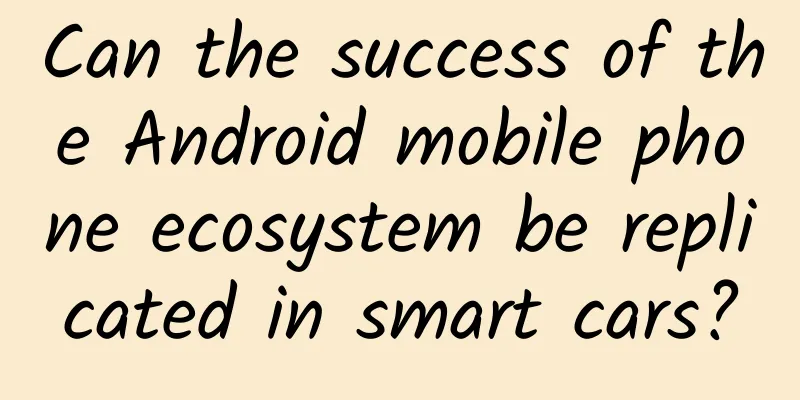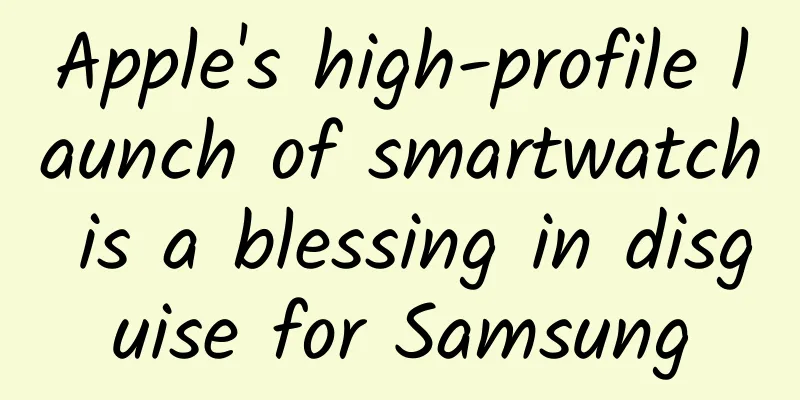Can the success of the Android mobile phone ecosystem be replicated in smart cars?

|
Even now, Microsoft still has a market share of over 90% in PC operating systems, but it has failed miserably in the smartphone market. In March this year, Terry Myerson, a Microsoft veteran and head of Windows business, announced his resignation from Microsoft. Before leaving, Myerson posted a farewell post on LinkedIn, in which he attributed Microsoft's failure in the smartphone business to two reasons: 1. Underestimating the business model of Google’s Android mobile operating system; 2. Build your own mobile operating system on a not very suitable, outdated technology platform (Windows CE platform). Cross-platform failure Microsoft developed a mobile operating system based on the Windows CE platform in an effort to transfer the system and application ecosystem advantages of the PC to mobile phones. When the smart platform changes, the operating system of the original platform may not be adapted to the new platform. This is the lesson Microsoft has taught us. Google and Apple are now a bit like Microsoft in the past. Apple and Google are doing similar things in terms of in-car operating systems, which is to establish a connection between smartphones and cars through Carplay or Android Auto. Why do operating system platform companies like to do this? Because the cost is low. The existing platform is already mature, so why start from scratch and develop a new system? Whether it is a PC or a smartphone, a mature operating system is accompanied by a complete application ecosystem. Whether it is Microsoft, Google, or Apple, it is difficult to give up the previous resources and advantages. But according to Microsoft's experience, cross-platform porting is a labor-saving but imperfect solution. Cars are far more complex than mobile phones, with more sensors and more complex systems. In the era of smart cars, the proportion of software in cars will gradually increase, and there will be more and more electronic control units and various functional modules in cars. The development of smart cars also requires cars to be equipped with more smart applications. As a bridge between smart applications and hardware, the in-vehicle operating system needs to undertake more complex tasks. Cars and mobile phones have different application scenarios. Some scenarios are naturally more suitable for mobile phones, such as reading headlines and chatting on WeChat. Some scenarios are more suitable for cars, such as navigation, parking fees, etc. It can be said for sure that cars do not need the millions of apps on mobile phones. The interaction methods of cars and mobile phones are also different. Touch screens are very suitable for mobile phones, but considering safety issues, they are obviously not the ideal interaction method for cars. Therefore, it is not appropriate to simply transfer the ecosystem of mobile phones to cars. For example, the popular in-car WeChat and in-car DingTalk must be customized and developed for car scenarios. Smart cars require an operating system specifically customized for them. Android's Problem in China With its openness and low barriers to entry, Android has been welcomed by application developers and mobile phone manufacturers. This has formed a virtuous circle. The more mobile phone manufacturers use Android, the more mobile phone application developers are willing to develop applications for Android. The richer the Android applications, the more mobile phone manufacturers cannot do without the Android system. Google, the owner of Android, provides the Android system for free and bundles its own applications with it, thereby earning advertising fees. But Google encountered an exception in its business expansion: China. Chinese mobile phone manufacturers use a deeply customized version of the Android system, but Google's applications cannot enter China, so Google's business model has encountered setbacks. Android will encounter similar problems in the era of smart cars. For example, the high-precision maps needed for autonomous driving must be made with domestic products instead of Google Maps. Moreover, it is not easy for Android to migrate from mobile phones to cars. Smart cars will become more and more complex in the future. Android needs a series of transformation, upgrades and maintenance. This requires continuous investment. Google cannot always be a free OEM for domestic OEMs. In July this year, the European Union issued a 4.34 billion euro antitrust fine to Google and asked Google to stop bundling its search engine and browser with its Android applications and stores. On October 16, Google announced that it plans to charge device manufacturers for launching the Play Store and other major Android apps in Europe. Clearly, Google is rethinking its profit model. The counterattack of local in-vehicle operating systems Car companies are good at hardware manufacturing but not at software development. It is not certain that car companies are incapable of independently developing operating systems or properly modifying Android. However, developing operating systems is obviously not easy for car companies. The development of in-vehicle operating systems requires long-term investment. Not only is development difficult, but subsequent iterations are also a huge project. At present, smart cars are still in their infancy and will become more and more complex in the future. The corresponding operating systems also need to be continuously upgraded and iterated. Maintaining a large software team is a huge burden for car companies. "We think it's not suitable to copy the Android mobile phone system to the car. It's like trying to cut a foot and put it in a shoe, cutting the foot to fit the shoe," said Xie Yan, chief architect of AliOS. The main focus of OEMs is still on automobile research and development. It is inevitable that they will be unable to develop their own in-vehicle operating systems and compete with third-party products. On the one hand, the cost is too high, and on the other hand, it is easy to have problems when modifying Android. The previous exposure of the Nio car crash exposed the problem of the car's Android system. Android is difficult to promote in China, but the Android model is still effective. If there is a cheap or even free in-vehicle operating system that is open to both car companies and developers, a smart car application ecosystem similar to Android may grow. Alibaba has been independently developing the in-vehicle operating system AliOS. In 2014, Alibaba reached a strategic cooperation with SAIC. In 2015, the two parties jointly established Banma Network. In 2016, the two parties jointly released the "world's first mass-produced Internet SUV" Roewe RX5. At present, Banma Zhixing, based on the AliOS system, has provided support for a series of Internet cars such as Roewe, Maxus, Ford, MG, and Dongfeng Citroen. AliOS is tailor-made for smart connected cars, unlike Android, which projects the operating system of mobile phones onto cars. At the same time, based on Alibaba's three-dimensional ecosystem, AliOS is also rapidly developing its own ecosystem. McKinsey believes that in 2018, about 10% of a car's value chain is software, and this may increase to 30% by 2030. Some people in the automotive industry believe that the proportion of software may be higher than the figure given by McKinsey. As the proportion of software in cars increases, the importance of in-vehicle operating systems will further increase. The automotive intelligent application ecosystem supported by in-vehicle operating systems will enrich the functions of cars and redefine the significance of cars as a means of transportation in modern society. As a winner of Toutiao's Qingyun Plan and Baijiahao's Bai+ Plan, the 2019 Baidu Digital Author of the Year, the Baijiahao's Most Popular Author in the Technology Field, the 2019 Sogou Technology and Culture Author, and the 2021 Baijiahao Quarterly Influential Creator, he has won many awards, including the 2013 Sohu Best Industry Media Person, the 2015 China New Media Entrepreneurship Competition Beijing Third Place, the 2015 Guangmang Experience Award, the 2015 China New Media Entrepreneurship Competition Finals Third Place, and the 2018 Baidu Dynamic Annual Powerful Celebrity. |
<<: Is it really enough for Tencent to position itself as an assistant in the smart car industry?
>>: The internationalization of Chinese home appliances is mostly forced
Recommend
Comparison of Flutter and React Native for mobile development
【51CTO.com Quick Translation】Just a few years ago...
Himalaya: The highest level of ASO, how does Himalaya promote its apps?
The ASO master we are going to talk about today i...
Entry-level products are awesome! Tencent invests $1 billion in Meituan Dianping
[[154656]] There are really big news on the Chine...
How to play with free channels - bringing in 300,000 users in three months
When a new APP product enters the market, how to ...
iOS multithreaded development: several details that are easily overlooked
Generally speaking, iOS developers can handle mos...
Smart TVs are becoming a powerful engine for sales growth in the color TV market
In recent years, the frequency of color TV produc...
Complete success! Key technology breakthroughs
The reporter learned from the Sixth Academy of Ch...
Several tips to improve Android ListView performance
Translator’s Note: 1. Since this is a technical a...
How to layout the automotive short video operation matrix?
Viewing cars, selecting cars, and using cars are ...
Trump wants to cancel subsidies for electric vehicles. Why did Musk, who made 4.6 billion from it, say he was willing?
Just like sodium meets water, when Musk meets Tru...
DS will launch its first pure electric SUV to compete with Audi Q2
According to Autocar, DS will launch its second S...
Huawei collects 5G patent fees, but is actually being forced into a corner
Ding Jianxin, director of Huawei's Intellectu...
How to create a highly active community from scratch? An article that explains the practical methodology!
In today's article, I mainly want to talk to ...
Drinking coffee increases cortisol. What should coffee addicts do?
Author: Xue Qingxin, registered dietitian Reviewe...









